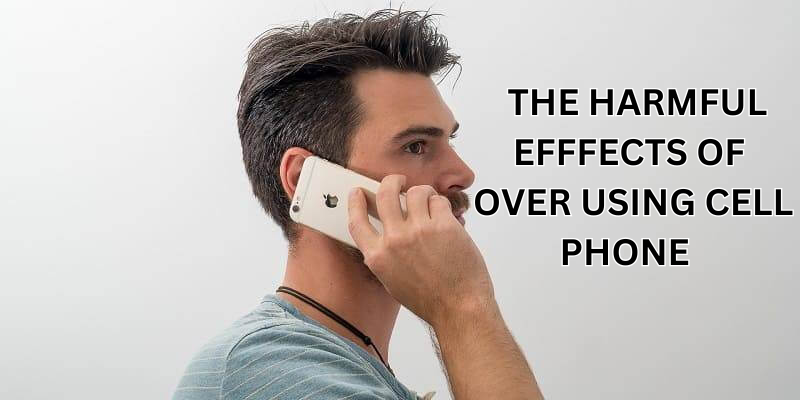Cell phones have become an indispensable part of our lives, connecting us to the world and making daily tasks more convenient excessive use of these devices comes with its downsides affecting various aspects of our well-being overusing cell phones can harm our physical health by causing eye strain headaches and even poor posture due to prolonged screen time it also impacts mental health leading to increased stress, anxiety and sleep disturbances constantly being glued to screens can affect personal relationships as people often prioritize virtual interactions over face-to-face communication productivity can also suffer as constant notifications and distractions make it harder to focus on work or studies.
Social isolation and addiction to apps or games further exacerbate the problem children and teenagers are especially vulnerable as excessive screen time can interfere with their emotional development and academic performance while cell phones are undoubtedly useful it is crucial to use them mindfully and set boundaries to avoid these negative effects striking a balance between staying connected and leading a healthy active life is the key to reaping the benefits of technology without compromising our well-being.
Physical Health Effects:
Excessive use of cell phones can have serious effects on physical health one of the most common issues is eye strain often referred to as digital eye strain or computer vision syndrome staring at a screen for too long can cause dry eyes blurred vision and headaches the blue light emitted by cell phones also disrupts sleep patterns by interfering with the production of melatonin the hormone that regulates sleep poor posture is another major concern as people often bend their necks or hunch over while using their phones leading to what is commonly called text neck over time this can result in chronic neck back and shoulder pain.
Which can contribute to weight gain obesity and related health problems like heart disease constant typing and swiping can also cause strain on the fingers wrists and hands potentially leading to repetitive strain injuries like tendinitis or carpal tunnel syndrome keeping phones close to the body such as in pockets has raised concerns about exposure to electromagnetic radiation though research on this is ongoing to maintain good physical health it is essential to take regular breaks practice proper posture and limit screen time.
Mental Health Effects:
Excessive cell phone use can take a significant toll on mental health impacting various aspects of emotional and psychological well-being one major issue is the increased risk of stress and anxiety caused by constant notifications messages and the pressure to stay connected all the time social media apps in particular can foster feelings of inadequacy or low self-esteem as people often compare themselves to the seemingly perfect lives displayed online spending too much time on phones can also lead to feelings of loneliness and social isolation as virtual interactions often replace meaningful face-to-face connections another critical concern is the impact on sleep.
Many people use their phones late into the night which not only delays sleep but also reduces its quality leaving them feeling tired and irritable in extreme cases excessive phone usage can result in addiction where individuals feel a compulsive need to check their devices even at inappropriate times this addiction can interfere with daily activities relationships and overall productivity creating a sense of frustration and helplessness to protect mental health it is essential to set limits on phone usage take regular breaks and focus on nurturing real-world relationships and activities that promote a sense of balance and fulfillment.
Social and Relationship Effects:
Excessive use of cell phones can have a significant impact on social interactions and personal relationships one of the most noticeable effects is the decline in face-to-face communication many people especially in social gatherings or family settings are more focused on their screens than the people around them this creates a sense of emotional disconnection as meaningful conversations and quality time are often replaced with mindless scrolling or texting overusing cell phones can also lead to misunderstandings and conflicts in relationships for instance a partner or friend may feel neglected or unimportant when their presence is overshadowed by constant phone usage.
Social media can further complicate relationships by fostering jealousy or insecurity through comparisons with others seemingly perfect lives or interactions online in families excessive screen time can hinder bonding as children and parents may become engrossed in their devices instead of spending time together friendships too may suffer as people become less present and engaged in real-world interactions relying heavily on virtual communication often limits the development of social skills making it harder to form deep and lasting connections.
Daily Life Effects:
One of the most common problems is a decline in focus and efficiency constant notifications messages and the urge to check apps frequently make it difficult to concentrate on tasks like work studying or household responsibilities this habit of multitasking often leads to mistakes and incomplete tasks causing frustration and stress overusing cell phones can interfere with daily routines such as eating exercising, or spending time with loved ones as people prioritize screen time over other important activities sleep schedules are also frequently disrupted with many staying up late to browse social media watch videos or play games.
This results in fatigue and reduced energy levels during the day making it harder to meet responsibilities in social settings excessive phone use can create awkwardness as people are often too distracted to engage fully with those around them even during moments of leisure the overuse of phones can prevent individuals from enjoying the present and appreciating their surroundings to maintain a balanced daily life it essential to set limits on phone use focus on priorities and allocate time for meaningful offline activities.
